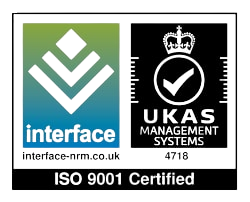Pre-employment video interviews for recruitment | 2024 Guide For Recruiters
In today’s rapidly-evolving job market, identifying and hiring top talent is crucial for organizations that are striving to build high-performing teams. As remote work (and virtual hiring) continue to gain traction, companies need to seek digital solutions to streamline their recruitment processes without sacrificing the quality of the hire.
In this article, we will explore the benefits of using pre-employment video interviews as a modern approach to recruitment. From reducing hiring costs and time-to-hire to providing deeper insight into candidates’ communication and interpersonal skills, video interviews offer a compelling alternative to conventional recruitment methods. Video interviews are a vital tool for organizations seeking to make informed hiring decisions and build exceptional teams.
We will delve into the ins and outs of video interviewing, including how it differs from traditional in-person interviews, its benefits and limitations, and how it can be effectively integrated into the hiring process. We will also provide real-world examples of how companies have successfully used video interviews to identify and hire top talent.
Contents
- What are video interviews in recruitment?
- What are the types of video interviews?
- How are video interviews used in hiring?
- Which organizations use video interviews in hiring?
- What skills can be assessed in candidates through video interviews?
- Why should you use pre-employment video interviews in hiring?
- When should you use pre-employment video interviews in hiring?
- Examples of pre-employment video interviews
- Why are video interviews better than Zoom/Microsoft Teams?
- How is artificial intelligence (AI) used in VI and why is it used?
- Why use Assess Candidates video interviews to hire
- Case Studies/Our experience
What is a video interview in recruitment?
Video interviews in recruitment refer to the process of conducting job interviews with candidates using video technology. This method of interview has gained popularity in recent years due to:
- convenience
- time-saving ability
- and the rise of remote work
Instead of conducting interviews in person, employers and hiring managers can connect with candidates virtually, regardless of their location.
Gartner report that 86% of organizations were using video interviews for recruitment by 2020. This suggests that organizations are finding video interviews to be an effective and efficient way to assess candidates remotely.
The high adoption rate of video interviewing indicates that it has become an accepted norm in the hiring process and is here to stay.
Let’s now take a look at the key video interview types that are currently used.
What are the types of video interviews?
The two main types of video interviews are called asynchronous and synchronous interviews.
What is the difference between Automated Video Interviewing (Pre-recorded/One-Way) and Live Video Interviewing?
Asynchronous interviews, also known as one-way video interviews for hiring, are a type of job interview that allow candidates to record their responses to predetermined time limits and selected interview questions at their own convenience. These interviews are typically conducted in the early stages of the hiring process before the candidate meets the hiring team in person.
Synchronous or live video interviewing, on the other hand, allows for more personal interaction between the interviewer and candidate, and can give the interviewer a better sense of the candidate’s communication skills and personality. It can also be easier to build rapport with a candidate during a live video interview. However, live video interviewing can be more challenging to schedule, and can be affected by technical issues or interruptions.
| Automated video interviewing (asynchronous) | One-way video interviews where candidates record answers to pre-recorded questions. |
| Live video interviewing (synchronous) | A real-time conversation between the interviewer and candidate. |
In summary, video interviews have become an increasingly popular tool for recruiters and hiring managers to screen candidates, save time and streamline their recruitment process. Whether automated or live, video interviewing can offer benefits such as greater flexibility, reduced costs, and improved efficiency.
But, just how do they differ from the traditional method? Check out our graphic below for some key points.
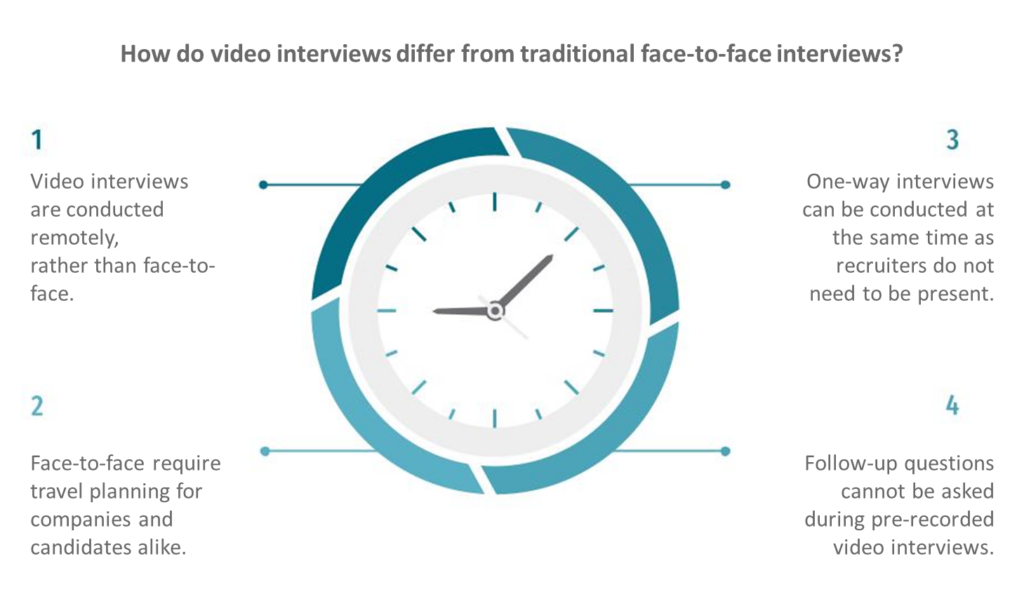
Did you know? A Totaljobs.com survey found that on average, graduates are willing to travel only 35 miles to meet a prospective employer. This highlights the benefit of video interviews, which allow candidates and employers to connect without the need for travel.
It’s clear video interviews are here to stay. We will now move onto how these are being leveraged by employers as part of their hiring processes.
Interview candidates with our automated recording software. Fast. Hire For Free
How are video interviews used in hiring?
Employers use one-way and pre-recorded interviews differently in light of their format. Let’s break down how each of these are used starting with one-way or asynchronous interviews.
Prior to both asynchronous and synchronous video interviews, the hiring team must select a reliable video interviewing platform that is user friendly and easy to navigate for both them and the interviewee.
How one-way interviews are used in hiring
- The hiring team invites candidates to record answers to a set of predefined questions which they must answer within a specified timeframe.
Questions should target the skills required for the role. These are often competency-based, such as, ‘give me an example of a time you demonstrated leadership’.
- The candidate records their responses to these questions using a video interview platform, which can be accessed through a desktop computer or a mobile device.
You need to ensure that clear instructions on how to complete the interview are provided and enough time has been allocated for the candidate to record their responses to each question.
- The hiring team reviews the candidate’s responses at their convenience, and can replay the video interview recording as many times as necessary to evaluate the candidate’s answers. Candidates are sifted/progressed accordingly.
Two-way or synchronous interviews differ in that they offer both the hiring team and the candidate to ask follow-up questions during the interview. Naturally, with the interview being live, questions are also more tailored to the candidate. Here’s how live interviews work.
How two-way video interviews are used in hiring
- The hiring team invites a candidate to a live interview with either an individual or multiple assessors.
Typically, multiple assessors are present at interview for more senior roles as part of a panel interview.
- The assessor/s prepare questions to ask the candidate. Some will be standardized to ensure consistency and fairness for all applicants, though there will be additional questions to understand each candidate at a more personal and deeper level.
When selecting questions to ask a candidate, consider questions that tap into their background specifically and the job requirements. You want to ensure the individuality of the candidate is celebrated but also ensure you are able to gather the information you need to make an informed decision. Open-ended questions are great too, as they allow the candidate to elaborate on their skills and experience.
- The assessor/s will probe during the course of the interview to ensure they fully understand the candidate’s response to a question.
This can be a great way to tap into the detail you need. For example, say a candidate was giving an example of how they were a team player and mention someone they disagreed with in their project. You may deliberately follow-up with a question on conflict resolution to see if they would handle this in line with your organizational culture.
- The interview closes with the candidate being allowed an opportunity to ask any questions about the company, role or process.
- The assessors are likely to revisit the recordings to cross-reference any notes they made and help with the decision-making process.
When reviewing the candidate’s responses, pay attention to their communication skills, their ability to answer the question comprehensively and concisely, and their overall professionalism.
- The hiring team get in touch with the candidate letting them know whether they were successful.
Having covered how video interviews are used in hiring, we will now cover which organizations are leveraging this technology.
Which organizations use video interviews in hiring?
Video interviews have become a popular tool in the recruitment process for a variety of organizations across different industries. Many companies have incorporated video interviews into their talent acquisition strategies to streamline the hiring process, reduce costs, increase efficiency and candidate experience.
Notably, a 40% surge has been observed in the utilization of online testing platforms by employers, further solidifying the trend towards modern and technology-driven recruitment methods.
Organizations of all sizes, from startups to large multinational corporations, can benefit from using video interviews in their recruitment process. Companies in the industries below are just a few examples of those who have embraced video interviews as a valuable addition to their hiring practices:
- Technology – Video interviews are welcomed in technology roles. Some employers that implement video interviews into their application process are Samsung, Amazon, Apple, Microsoft.
- Finance – Video interviews are often used for banking and finance jobs. Most banks and financial institutions use video interviews and among them are Barclays, HSBC, JP Morgan and Bank of America.
- Retail – Video interviews are frequently used in retail jobs. Some retail companies using video interviews consist of: Marks & Spencer’s, Walmart, Amazon and Costco.
- Consulting – Video interviews are used in consulting jobs. Some consulting companies using video interviews consist of: KPMG, PwC, Deloitte and EY (also known as ‘the big four’.)
Effective incorporation of video interviews into an organization’s talent acquisition strategy requires careful planning and execution:
- Use pre-recorded video interviews as a preliminary screening tool to quickly evaluate a large pool of candidates before conducting more in-depth assessments such as two-way video interviews, in-person interviews or online assessments. This can help organizations to reduce the time and resources required to assess candidates and increase their chances of identifying the best fit for the role.
- Use one-way and two-way video interviews in combination with other recruitment methods such as online assessments to provide a more comprehensive view of a candidate’s skills and qualifications. For example, online assessments can be used to evaluate a candidate’s technical skills and knowledge, while video interviews can be used to assess their communication skills and cultural fit with the organization.
- Use one-way and two-way video interviews to broaden your candidate pool by conducting interviews remotely, which can be particularly useful when recruiting candidates from other regions or countries. This can help to increase the diversity of the organization’s workforce and access a wider range of talent.

If your organization is uncertain about the suitability of incorporating video interviews into your recruitment process, feel free to reach out to us. We offer a free-of-charge assessment of your requirements, allowing you to make an informed decision based on expert recommendations.
Let’s now move onto skills video interviews help to assess when screening candidates.
What skills can be assessed in candidates through video interviews?
Video interviews are becoming increasingly popular among recruiters and hiring managers as a way to assess candidates‘ skills and suitability for a job. They offer an opportunity to evaluate candidates’ communication skills, body language, and non-verbal cues in a more convenient and cost-effective way than traditional face-to-face interviews. Here are some of the skills that can be assessed in candidates through video interviews:
- Communication skills: Video interviews allow recruiters and hiring managers to assess candidates’ ability to communicate effectively, including their verbal and non-verbal communication skills, such as eye contact, tone of voice, and body language.
- Technical skills: For technical roles, video interviews can be used to evaluate a candidate’s proficiency in specific technical skills, such as coding, design, or data analysis. By asking relevant questions and reviewing their answers, recruiters can assess a candidate’s technical abilities.
- Problem-solving skills: By asking open-ended questions, recruiters can assess a candidate’s problem-solving skills and their ability to think on their feet. This can be particularly useful for roles that require creativity and innovation.
- Cultural fit: Video interviews can provide insights into a candidate’s personality, work style, and values, which are essential for assessing cultural fit. By observing their behavior, tone, and communication style, recruiters can evaluate whether the candidate is likely to fit into the organization’s culture.
The following steps can help ensure that video interviews are aligned with hiring goals and job requirements:
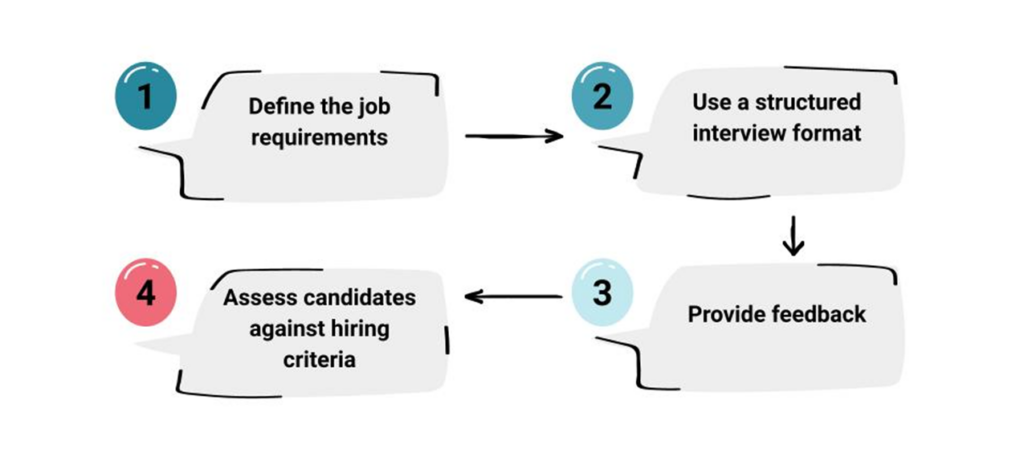
- Define the job requirements: Before conducting video interviews, define the job requirements and identify the skills and competencies that are essential for the role. Use this information to create a list of questions that will help assess candidates‘ suitability for the role.
- Use a structured interview format: To ensure that all candidates are evaluated consistently, use a structured interview format that includes a set of predetermined questions. This will help ensure that all candidates are evaluated using the same criteria.
- Assess candidates against hiring criteria: Use the hiring criteria to evaluate candidates’ responses to the questions. This will help ensure that you are assessing candidates against the requirements of the role.
- Provide feedback: After completing the video interviews, provide feedback to candidates on their performance. This will help them understand how they can improve and what skills they need to develop to be successful in the role.
The process for two-way or live interviews is largely the same, however as we covered above, these will also include the added step of creating questions unique to each candidate. This ensures a more personal feel to the interview whilst the skills being looked for are assessed.
We will now cover why you should consider using video interviewing as part of your organization’ recruitment process.
Screen your candidates in minutes. Try a video interview today. Hire For Free
Why should recruiters use video interviews in hiring?
TOP 7 REASONS (PROS) TO USE VIDEO INTERVIEWS IN RECRUITMENT
| Benefit of video interview | How video interviews help with this | Who does this benefit? |
|---|---|---|
| Cost and time savings | Video interviews reduce costs associated with in-person interviews, such as travel expenses and meeting room rentals. This can save time for both the candidate and the interviewer. | Company and candidate |
| Ability to involve multiple assessors | Interview recordings can be shared within the organization for appraisal from multiple assessors. Multiple stakeholders accessing the recordings will support in taking an informed, balanced and unbiased decision. | Company |
| Help with sifting | Video interviews can be used at an early stage to help screen candidates. | Company |
| Standardized and legally defensible | Pre-recorded video interviews can provide a more objective evaluation of candidates, as each candidate is evaluated on the same set of questions and can be compared directly with other candidates. Recordings can evidence why a candidate was selected or not selected for the next stage. | Company |
| Improved candidate experience | There is no need to coordinate schedules between the interviewer and the candidate. Interviewers can review the responses at their convenience, whilst candidates can feel calmer and record responses at a comfortable and convenient time for them. | Company and candidate |
| Expands geographical pool of candidates and provides flexibility | Expands the talent pool and allows remote candidates from around the world to broaden their employment opportunities. | Company and candidate |
| Predict future performance | Video interviews have a proven record of predicting high performance in employees. To achieve this, make sure professionals validate the tests according to industry standards. | Company |
According to a survey conducted in 2014, more than 65% of candidates expressed a preference for video interviews during the hiring process
So, are virtual interviews just as effective as face-to-face interviews? Yes and no. Pre-recorded video interviews offer several advantages over traditional face-to-face interviews, such as saving time and resources, as they eliminate the need for scheduling and coordinating interviews with multiple stakeholders. Video Interviews also provide a more objective evaluation of candidates, as each candidate is evaluated on the same set of questions and can be compared directly with other candidates.
Let’s now move onto the drawbacks of video interviewing technology and how these can be mitigated for your talent acquisition process.
TOP 6 POINTS (CONS) TO CONSIDER WHEN USING VIDEO INTERVIEWS:
| Con of video interview | How video interviews may result in this | How to mitigate the impact on your process |
|---|---|---|
| Video interviews are more impersonal than face-to-face interviews | Pre-recorded video interviews can be perceived as impersonal or robotic, which can make it difficult for candidates to form a connection with the hiring team. As a company, you also miss out on valuable non-verbal communication, often vital supplementary cues, to support your decision-making. | Provide feedback to the candidate after the interview, thanking them for their time and highlighting what impressed you about their application. Additionally, you may opt for a live interview rather than one-way/prerecorded for a more personal conversation. |
| Speaking to a webcam can be anxiety-inducing | Many job seekers fail to attempt the video interview because of anxiety and the lack of first-hand experience. This may lose you potential candidates in the search for top talent. | Encourage candidates to practice beforehand, so they will feel more at ease when tackling the assessment. This will ensure they present their true ability under typical working conditions. |
| Technical issues can affect candidate experience and cost time | Video interviews can be subject to technical difficulties, such as poor video or audio quality, which can impact the evaluation process. Additionally, candidates must be reset if they have launched an assessment by mistake which can cost companies added admin time. | Ensure you have clear instructions on how to use the video interviewing software to ensure candidates have tested their camera and microphone. Additionally, make sure they are using the right browser. |
| No opportunity for questions from the interviewer or interviewee | Asking follow-up questions is a key ingredient to the interview process, allowing the interviewer and interviewee the opportunity to gather all the information they need. | Introduce an automated email after the process to allow candidates the opportunity to ask you any questions. Alternatively, reach out with follow-up questions once you have reviewed their recordings and encourage them to do the same. |
| Candidates miss out on exposure to your company culture | Getting a feel of a company’s culture through an office meet and greet is beneficial to both candidates and companies to ensure a good fit. | Include a welcome video to introduce your company and offices to candidates at the start of the process. You can also invite shortlisted candidates to an assessment center. These are a key stage for most recruitment processes and can be a good final step to see if a company and candidate align. |
| Lack of stable internet connections in some areas can cost you applicants | Video interviews require a more stable internet connection versus other online assessments. You may not receive submissions from some candidates in light of this, lightening your talent pool. | Allow an audio-only interview for regions where it may be more difficult to secure a more stable internet connection. Alternatively, use a one-way interview as these are easier to run versus live interviews that require a greater internet connection. |

Now that we have a balanced approach to the pros and cons of video interviewing, we will cover when this should be used in your hiring process.
When should you use pre-employment video interviews in hiring?
Pre-employment video interviews can be a valuable tool in the hiring process, but they are not appropriate for every role or situation.
Here are 6 factors to consider when deciding whether to use video interviews in your hiring process:
- Volume recruitment
- One-way or pre-recorded video interviews are great for roles where you are looking to assess lots of candidates in minutes. At the click of a button, you can invite and effectively screen candidates in minutes.
- Multiple assessors
- One-way or pre-recorded video interviews can be shared with multiple assessors. Consider if you would like multiple assessors to interview a candidate or simply watch recordings back to collectively select who to progress. If the former is a must, then a live interview is the interview type to opt for.
- Type of Role
- Live and pre-recorded video interviews are particularly useful for roles that require strong communication skills, such as sales, customer service, and leadership positions. Also effective for technical roles that require specific skills, such as software development or engineering.
- Business Line
- One-way and two-way video interviews can be beneficial for businesses that operate across multiple locations, allowing them to connect with candidates regardless of their location. Video interviews can be useful in industries where the workforce is primarily remote, such as IT, digital marketing, or creative services.
- Job Level
- Asynchronous and synchronous video interviews are most effective for entry-level and mid-level positions.
- Time and Cost Constraints
- One-way and two-way video interviews (the former in particular) can save time and reduce costs associated with travel and scheduling, making them a convenient and efficient option for busy hiring managers.
What roles should video interviews be used to recruit for and why?
Video interviews can be used for any role. Below is an outline of examples of roles in which video interviews may be used and one-way or two-way interview questions that may be asked.
Video interviews in retail:
| Retail Role | Role Description | What video interview questions apply to this role? |
|---|---|---|
| Department Managers | Department managers oversee the functioning and productivity of a company division. Their responsibilities include recruiting and dismissing staff, establishing, and working towards strategic departmental goals and managing a departmental budget. | – How would you handle a difficult employee? – How do you train new employees? – What would you do if there was a shift that was understaffed? |
| Retail Salespeople | Retail salespeople facilitate purchases and share knowledge with customers to ensure a trouble-free buying experience. | – Can you describe an instance where you effectively upsold or cross-sold a product? – Describe your approach to meeting sales targets and driving revenue. – Give me an example of a time where you have experienced commission-based compensation. |
| Retail Advisors | Retail and sales advisors facilitate sales transactions by advising customers on suitable products that best meet their needs and encourage purchases. They explain product features and benefits to customers, assist them in locating specified products on the sales floor, and process customer payments. | – Why do you think you are suited to this role? – Tell us about a time you have demonstrated leadership skills? – Why are you interested in our company? |
| Visual Merchandisers | A Visual Merchandiser is responsible for planning and building displays that maximize impact on a day-to-day basis. They move equipment, arrange lighting and work with suppliers, while maintaining close connections at wider retail levels. | – Which of your projects shows off your creativity to the max? – How do you make the most of your visual merchandising budget? – What factors contribute to a great window display for the store? |
Video interviews in finance:
| Finance Role | Role Description | What video interview questions apply to this role? |
|---|---|---|
| Finance/accounting Graduate Scheme | Entry Level Financial Analysts are responsible for consolidating and analyzing budgets and income statement forecasts. They perform analysis of actual results at corporate and division levels. | – What is your greatest achievement? – Tell me one change introduced by the government which has had an impact on financial services? – Tell me about a recent piece of news that’s interested you? |
| Mortgage Advisor | Responsibilities as a Mortgage Advisor include meeting clients in person, or over the phone, assessing which type of mortgage is most suitable for each client, keeping up to date with new mortgage products and changes in mortgage regulation. | – What was the most stressful situation you have faced? – What attracted you to this company? – If you were hiring a person for this job, what would you look for? |
| Bank Cashier/Bank Teller | A Bank Cashier, or Bank Teller provides face-to-face services in banks and handles customers’ concerns and complaints. Their duties include greeting customers, opening, and closing accounts and handling deposits and withdrawals. | – Where do you see yourself in 5 years? – How would your previous co-workers describe you? – What are you passionate about outside of work? |
Video interviews in technology:
| Information Technology Role | Role Description | What video interview questions apply to this role? |
|---|---|---|
| Technical Support | Technical Support team members monitor and maintain the technology of the workplace. They respond to requests to help users in the business. Technical Support provides you with the opportunity to work in different types of companies and the chance to explore different industries. | – What are the most important skills in IT and why? – How would you begin a newly assigned IT project? – How would you ensure a difficult IT task or project is delivered on time and budget? |
| Business or Data Analyst | Working as a Business Analyst is all about looking for ways to improve the processes and business operations using technology. You will be required to analyze business needs, gather requirements, and create a project plan to design technological solutions. | – What are the essential tools for business analysts? – How do you approach a new analysis project? – How do you explain technical concepts to clients? |
| Software Engineer | As a Software Engineer, you will be required to design and program system software. This requires the understanding of software and hardware functions. The role provides a lot of interaction with other areas of the business to assess and provide solutions. | – Can you describe your process for planning and executing a programming task? – How do you explain technical concepts to stakeholders or colleagues without a technical background? – In your opinion, what distinguishes a great software engineer from a good one? |
Video interviews in consulting:
| Consulting Role | Role Description | What video interview questions apply to this role? |
|---|---|---|
| Recruitment Consultant | Recruitment Consultants work closely with the hiring team to introduce effective recruitment strategies. It largely involves understanding hiring needs, selecting the right tools and leveraging technology to streamline the process. | – How do you ensure an organization’s recruitment strategy aligns with its goals?- – How would you ensure quality candidates are selected at pace? – How do you measure the effectiveness of a recruitment strategy? |
| Process Improvement Consultant | Process Improvement Consultants focus on maximizing efficiency in a given area of an organization. For example, they may be asked to work with Operations to streamline their various processes in handling day-to-day work, or HR to better manage employee performance. | – Give me an example of a time where you effectively revamped a process within an organization. – How do you measure the success of any change to a process you implement? – How do you ensure your recommendations are sustainable and will work over the longer-term? |
| Strategy Consultant | Strategy Consultants work to develop and implement strategies to drive organizational growth. Typically, strategy consultants work with the top-tier of management to navigate complex challenges and make informed decisions. | – What steps would you take to ensure your strategies are implemented over the longer-term? – How do you conduct market research and analysis to ensure you are well-informed prior to recommending growth opportunities for clients? – How do you ensure the viability of any initiatives you propose? |
| Management Consultant | Management Consultants work with organizations to improve their overall performance, working closely to target and resolve complex business strategies. The role often involves data analysis, research and providing recommendations. | – How do you establish credibility and build relationships at different levels of an organization? – How do you keep up with the latest industry trends to ensure you are up-to-date? – Can you share an example of when you |
Video interviews in engineering:
| Engineering Role | Role Description | What video interview questions apply to this role? |
|---|---|---|
| Civil Engineer | Civil Engineers are predominantly involved in the design, construction and maintenance of infrastructure projects. This may include, building, dams and water supply systems, and often involves collaboration with other team members to ensure successful completion of a project. | – Can you highlight a significant architecture you have worked on, outlining your contributions to the project’s success? – How do you stay up-to-date with the latest developments in civil engineering? – How do you navigate stakeholder expectations during a project? |
| Chemical Engineer | Chemical Engineers apply chemistry, physics and engineering to the production, transformation and utilization of chemicals and materials. | – How do you approach risk assessment when undertaking a project? – Can you provide an example of a complex chemical engineering project you worked on, focusing on your approach to solving problems? – Describe your experience in working with simulation and modeling software. |
| Industrial Engineer | Industrial Engineers optimize complex systems, improve efficiency and maximise productivity. They do this by analyzing workflows, identifying bottlenecks and streamline processes. | – Provide an example of a project where you improved efficiency with your expertise. – How do you ensure successful implementation of a change you propose? – How do you measure the effectiveness of your initiatives and how do you communicate these to stakeholders involved? |
Having covered some of the video interviews used in popular industries, let’s work through some example video interview questions you can ask more broadly.
Examples of pre-recorded video interviews
It is vital to ensure when choosing a video interview provider, they capture all the questions and competencies you want the individual to tap into for the required role. At Assess Candidates, we have a bespoke solution to customize your video interview. We also provide a variety of question styles to highlight candidates’ strengths and weaknesses as well as different industries including:
| Accounting | Banking | Consulting |
| Construction | Engineering | Finance |
| HR | Law | Marketing |
| Retail | Technology |
To help you visualize the video interviews used in candidate selection, here are some examples of video interview questions.
Screen candidates using interview questions created by experts. Hire For Free
Competency-based interview question:
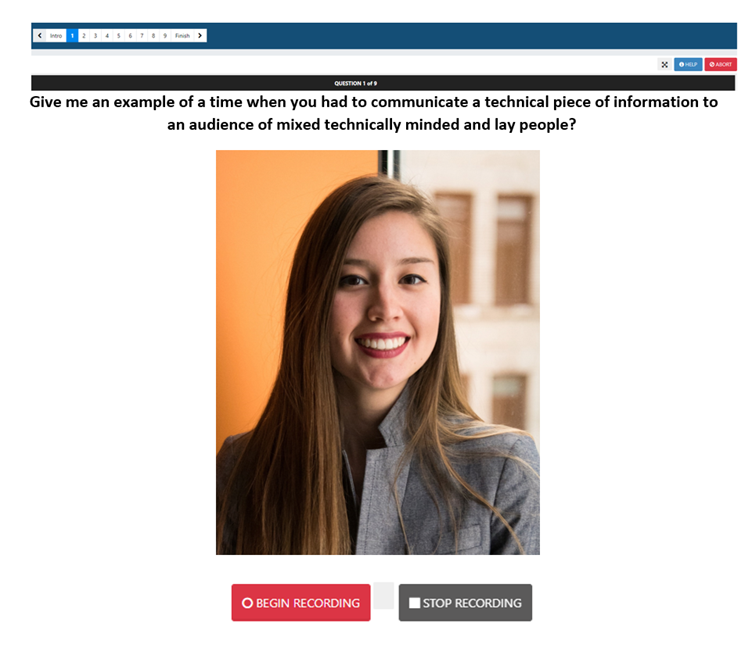
Motivational-based interview question:

Strength based Interview Question:
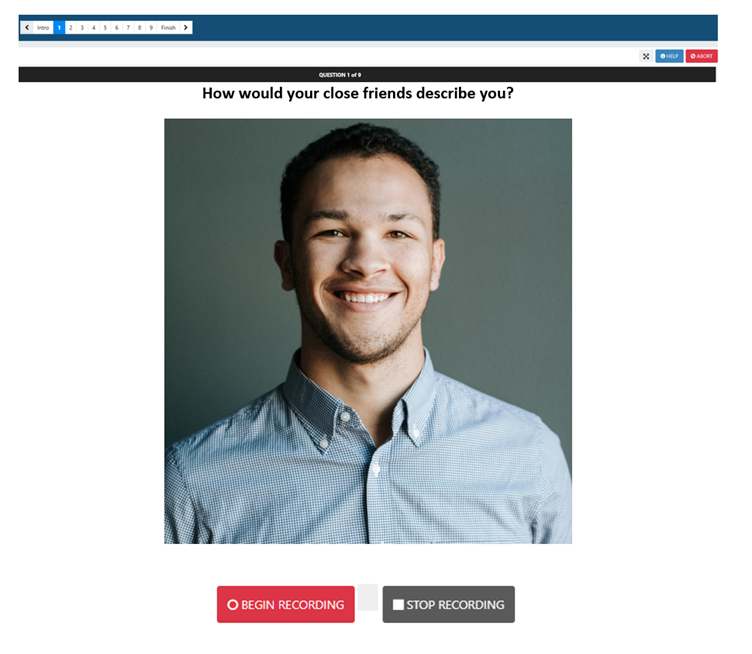
Technical Interview Question:
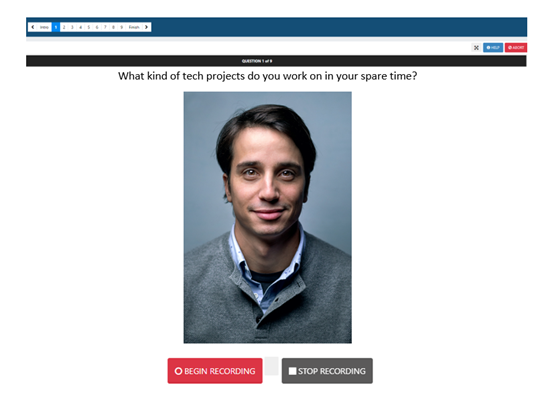
There is no right or wrong solution for questions in a video interview, candidates must answer based on their research on an employer and past experiences.
The pre-recorded video interviews we offer each contain 9 questions. Candidates typically have two minutes to answer each automated interview question. However, the amount of time assigned per question is entirely customisable.
Let’s now move onto the differences between video interviewing technology and commonly used video recording platforms.
Why are video interviews better than Zoom/Microsoft Teams?
Pre-recorded and live video interviews conducted through a video interviewing platform, versus interviews conducted through Zoom or Microsoft Teams, are two different approaches to virtual interviewing. While both have their benefits, interviewing using a video interviewing platform (whether live or pre-recorded) offers several advantages over video interviews conducted over Zoom/Teams.
Below are some reasons why a video interviewing platform can benefit your company, rather than using Zoom and Microsoft Teams:
- Pre-recorded and live interviews allow easier access to candidate recordings – With video interviewing platforms designed with recruitment in mind from the outset, it is easy to find candidates and their accompanying recordings. This may be more challenging for Zoom/Teams accounts often shared with multiple stakeholders for different purposes.
- Pre-recorded and live interviews allow flexibility – The candidate can take the interview at a time and place that is convenient for them. This means that they can take the time to prepare and present themselves in the best possible light. It also means that the interviewer can review the recorded responses at a time that is convenient for them, allowing for a more efficient use of time and resources.
- Pre-recorded video interviews allow consistent and objective evaluation of candidates – These interviews provide a standardized and controlled environment for each candidate to respond to the same questions. This makes it easier to compare and evaluate candidates objectively based on their responses.
- Pre-recorded video interviews may have additional back-end data – Video interviews produce reports about each candidate and can have the added functionality to view more about their performance, such as confidence, helping to compare individuals.
One such example of back-end data is the use of artificial intelligence to support hiring decisions.
How is artificial intelligence (AI) used in Video Interviews and Why is it used?
Artificial intelligence (AI) is revolutionizing the video interview process by automating tasks such as candidate scoring, facial recognition, and voice recognition. AI is the use of machines to perform tasks that typically require human intelligence, such as visual perception, speech recognition, decision-making, and language translation.
Major companies such as Hilton, HSBC and Unilever have used AI interview software. This allows companies to interview large numbers of potential candidates even more efficiently than they otherwise could. AI-enabled hiring software can quickly scan interviews with hundreds of applicants.
The importance of AI lies in its ability to analyze vast amounts of data in real-time, identify patterns and insights that are invisible to the human eye, and make predictions based on that analysis. This enables HR professionals to do the following more efficiently:
- streamline the hiring process
- make data-driven decisions
- identify top candidates
The incorporation of artificial intelligence into HR procedures is a fresh and most likely irreversible movement. When it comes to hiring, as many as 86% of employers use technology-facilitated job interviews, with an increasing number of them opting for automated video interviews (AVIs)
AI technology can be used to enhance the video interview process in several ways. For example, facial recognition software can analyze a candidate’s facial expressions, tone of voice, and body language to determine their level of confidence, enthusiasm, and engagement. This helps recruiters evaluate a candidate’s soft skills, such as communication, emotional intelligence, and cultural fit, which are difficult to assess through a resume or phone screen.
However, there are ethical and legal considerations to keep in mind when using AI technology to assess candidates. Recruiters should check that the algorithms used are free from bias and discrimination and that candidates are treated fairly and with respect. It is also important to provide candidates with transparency and an opportunity to opt-out of the process and toggle off AI if they have concerns about the use of AI technology.
We will now cover why you should use Assess Candidates for video interviews to recruit.
Why use Assess Candidates video interviews to hire
Assess Candidates video interviews are an effective tool for streamlining the hiring process and identifying the most qualified candidates.
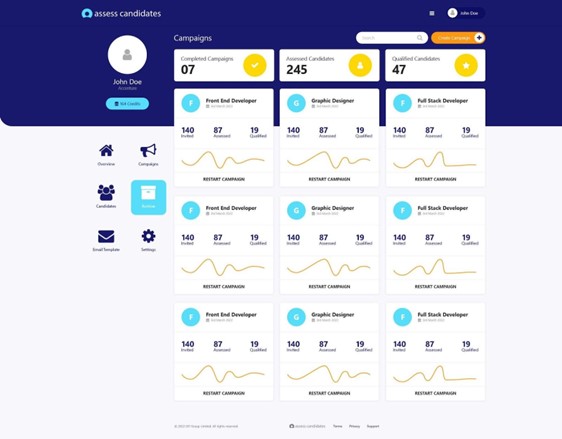
Here are four reasons why you should consider using Assess Candidates video interviews in your hiring process:
- Efficient Screening: Pre-recorded video interviews allow recruiters to quickly screen candidates at scale, which is particularly useful for high-volume hiring needs. By leveraging the Assess Candidates platform, recruiters can pre-screen candidates asynchronously, at any time, from anywhere using pre-defined or custom questions. This approach reduces the time and resources spent on phone screenings, and it provides hiring teams with a more comprehensive understanding of the candidate before investing more time in the selection process.
- Consistency: Pre-recorded video interviews ensure that all candidates are asked the same questions and are evaluated in a consistent manner. This eliminates the potential for unconscious bias and subjective decision-making that can occur in face-to-face interviews. Additionally, the Assess Candidates platform provides a structured way of assessing candidates and easy comparison of candidates.
- Time and Cost-Effective: Pre-recorded video interviews can save significant time and cost throughout the recruitment process. They can reduce the number of in-person interviews required, which saves time for both recruiters and candidates, and it eliminates the need for travel and other expenses associated with traditional interviews. The Assess Candidates platform enables recruiters to complete the entire interview process remotely, from inviting candidates to sharing interview results and collaborating with colleagues on hiring decisions.
- Better Hiring Outcomes: With Assess Candidates video interviews, recruiters can assess not only the candidate’s qualifications but also other factors such as communication skills, personality, cultural fit, and job-specific competencies. This allows hiring teams to make more informed hiring decisions, which can lead to better retention rates, higher job satisfaction, and improved overall hiring outcomes.
Assess Candidates video interviews ultimately provide a modern, user-friendly, and scalable solution to streamline the hiring process and ensure a more accurate assessment of candidate qualifications, skills, and fit. Here is an example case study of how Assess Candidates video interviews have been used previously.
Case Studies/Our experience
IT consulting company Implements Assess Candidates Video Interview Platform to Streamline Recruitment Process
Problem:
The HR team at the IT consulting company needed to find a more efficient and effective way to assess candidates while maintaining the quality of hire. They required a solution that would help them identify the best candidates quickly and efficiently, without sacrificing the personal touch of the hiring process. Traditional recruitment methods were time-consuming and often failed to deliver the quality of hire they needed.
Solution:
After conducting extensive research on modern recruitment techniques, the HR team decided to implement the Assess Candidates Video Interview Platform. The platform provided the team with a digital solution to assess candidates‘ technical skills, communication skills, and overall fit for the role.
The Assess Candidates Video Interview Platform allowed candidates to complete an automated video interview, answering pre-set technical questions worked on by the company and one of our experts. The HR team could then evaluate each candidate’s responses at their convenience, without the need for time-consuming in-person interviews. The platform also provided AI feedback on the candidates performance, allowing the team to make data-driven hiring decisions.
Result:
The Assess Candidates Video Interview Platform proved to be an excellent solution. It helped the HR team identify the best technical candidates quickly and efficiently, without sacrificing the quality of hire. The platform reduced time-to-hire, enabling the company to fill open technical positions promptly. Additionally, the platform provided valuable insights into candidate performance, enabling the HR team to make informed hiring decisions. As a result, the IT consulting company was able to build a high-performing technical team that was essential for achieving their growth objectives. Candidate feedback on user experience was overwhelmingly positive: Ease of use, elimination of stress and an interactive and visually enhanced solution that worked for hiring managers and job candidates alike.
